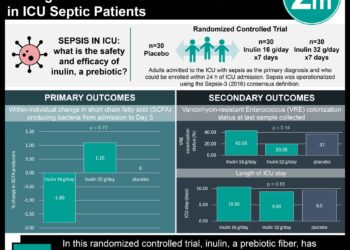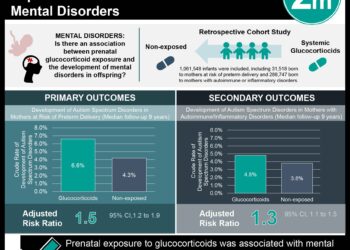Among sepsis survivors, primary care interventions not associated with improved mental health outcomes
1. Compared to standard care, 6 months of primary care interventions were not associated with any improvement in mental health-related quality of life (QoL) among survivors of sepsis.
2. At 6 months of follow up, patients receiving primary care interventions reported improved physical functioning and an increased ability to perform activities of daily living (ADL).
Evidence Rating Level: 1 (Excellent)
Study Rundown: Sepsis, a severe systemic inflammatory response triggered by an infection, is a common entity requiring care in the intensive care unit (ICU). As mortality from sepsis decreases, the morbidities associated with post-sepsis survival present a rising concern. However, little is known about the optimal outpatient management of sepsis survivors. This study sought to determine whether a primary care-based intervention based on actively following and addressing patient’s post-sepsis concerns would lead to improved mental health-related QoL. After 6 months of intervention, the study found that patients receiving primary care interventions did not have significantly better mental health-related QoL compared to those receiving standard care, although they did report improvements in physical functioning and performance of ADLs.
This is the first large-scale randomized, controlled trial that sought to improve outcomes in sepsis survivors post hospital discharge. Though the study was well-designed, and benefited by utilizing previously incorporated PCP relationships, it was limited in a few ways. Most concerning for the reliability of the results, 22.7% of all patients were lost to follow up, and only 70.3% of patients in the intervention group received the planned therapy. Nevertheless, this study demonstrates that comprehensive follow up care for sepsis survivors may improve their physical functioning and further research is needed to identify the interventions most effective in improving long-term QoL.
Click to read the study, published today in JAMA
Relevant Reading: Long-term mortality and quality of life in sepsis: a systematic review.
In-Depth [randomized controlled trial]: This randomized, controlled trial was conducted in Germany and assigned 148 patients to receive comprehensive primary care-based post-sepsis therapy and 143 patients to receive usual primary care without additional monitoring. The tested intervention specifically consisted of a post-sepsis information packet, specialty services contacts, and frequent follow up by a case manager for symptom monitoring and management. Patients received 6 months of their assigned intervention and were followed for 12 months in total. The primary outcome assessed in this study was the change in mental health-related QoL 6 months after discharge from the ICU, as assessed by the SF-36 questionnaire. At baseline, patients in both groups had mental health-related QoL levels similar to the population as a whole—depressive symptoms were present in 24.2% of participants and PTSD symptoms in 19.6%. There was no significant difference in the primary outcome at 6 months (mean change MCS score 3.79 vs. 1.64, p = 0.28). However, the intervention group demonstrated improved physical functioning (mean XSDMA-F score 38 vs. 46.9; p = 0.04), less physical disability (mean XSFMA-B score 42.5 vs. 52.4; p = 0.03), and fewer ADL impairments (mean 8.6 vs. 7.6; p = 0.03) than the control group at 6 months.
Image: CC/Wiki
©2016 2 Minute Medicine, Inc. All rights reserved. No works may be reproduced without expressed written consent from 2 Minute Medicine, Inc. Inquire about licensing here. No article should be construed as medical advice and is not intended as such by the authors or by 2 Minute Medicine, Inc.







